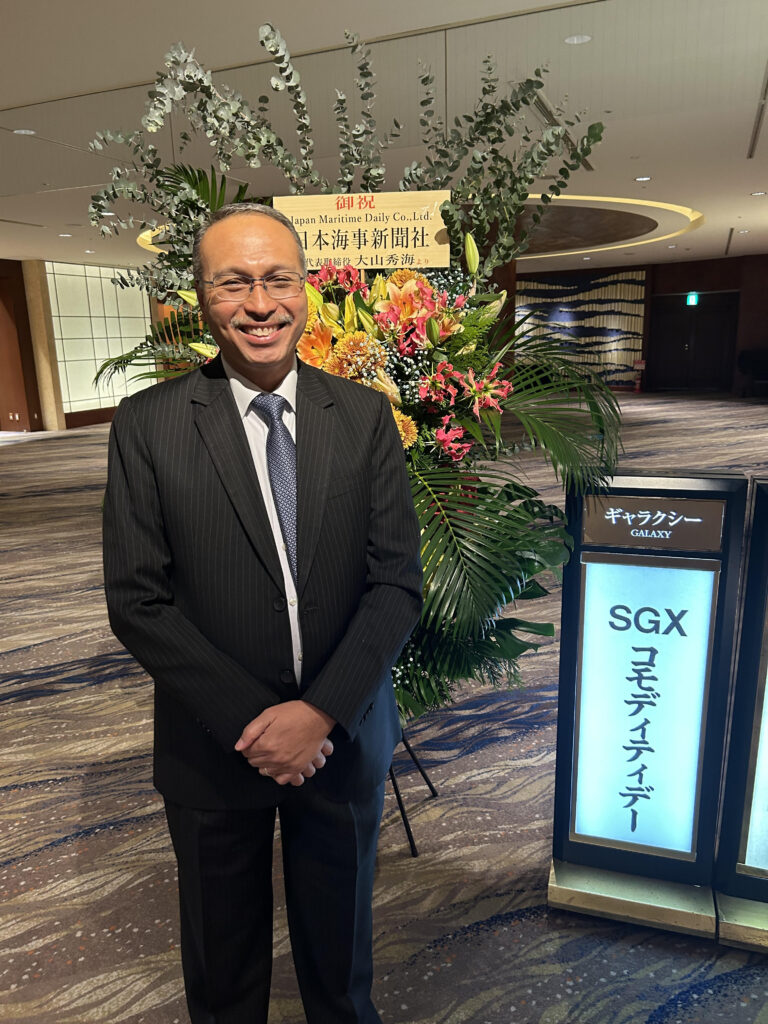
Oslo-based DNV is globally renowned for its expertise in risk management. With operations spanning over 100 countries, boasting a diverse workforce of 16,000 individuals from 85 nationalities across 300 offices worldwide, DNV specializes in certification, classification, and technical advisory services. In the maritime industry’s pursuit of decarbonization, what role does DNV play? To explore this, we interviewed Dr.Shahrin Osman, DNV’s Director, who addressed the audience at the “SGX Commodity Day” seminar in Tokyo on November 6th. (By Hirofumi Yamamoto)
Q1: Firstly, could you provide an overview of DNV’s maritime sector?
Founded in Oslo in 1864, DNV merged with the German classification society Germanischer Lloyd in 2014, forming DNV GL. In 2021, we rebranded as DNV. Our primary focus in the maritime sector involves offering assurance through classification, certification, independent Maritime Advisory, and extensive training (Maritime Academy).
Q2: Dr. Osman emphasized the importance of the maritime ecosystem focusing on industry transformation through decarbonization and digitalization. Could you elaborate on what this means for us, based on Dr. Osman’s statements?
With various stakeholders, including national governments, regional institutions, financiers, cargo owners, and charterers pushing for a faster transition, the International Maritime Organization (IMO) revised its targets at MEPC 80 in July 2023. The new targets include a 20% reduction in emissions by 2030, a 70% reduction by 2040 (compared to 2008 levels), with the ultimate goal of achieving net-zero emissions around 2050. New regulations are expected to take effect around mid-2027.
Beyond the IMO, the European Union (EU) plays a crucial role in driving maritime decarbonization. Shipping has been included in the EU’s emission trading scheme (EU ETS), set to commence in 2024, along with well-to-wake GHG requirements (FuelEU Maritime) to prevent emissions shifting to other sectors.
DNV asserts that the IMO is the optimal platform for meeting shipping’s emissions reduction obligations, emphasizing that ambitious climate goals, while commendable, may lead to confusion and an uneven playing field if implemented through regional regulations.
DNV welcomes regulations supporting greener shipping but stresses that regulations alone are insufficient. The three key drivers for ship decarbonization are expected to be regulations and policies, access to investors and capital, and cargo owner and consumer expectations.
This evolving business environment necessitates shipping companies’ adaptation to increasingly stringent emissions regulations, accelerating their journey toward decarbonization and digitalization. Collaboration across the entire shipping value chain is urgent, with participation in Joint Industry Projects crucial for establishing common standards, sharing knowledge, proceeding with pilot projects, and implementing changes.
Digitalization is identified as a key enabler of the energy transition, requiring common standards for managing risks across distributed and interlinked cyber-physical systems throughout value chains. DNV has invested in data standards, including the recently published Vessel Emissions Reporting Standard (VERS 0.9) on Veracity, contributing to Energy LEAP’s efforts to harmonize the industry’s approach to regulatory requirements.
Q3: Dr. Osman highlighted that the financial burden of decarbonization will be borne by shippers, operators, or shipowners. Who, in your opinion, should shoulder the burden for investments in decarbonization?
Regulatory changes, stakeholder expectations, and public pressure to decarbonize will impact commercial conditions in shipping. Consequently, businesses must ensure sound long-term capital expenditure decisions to prevent assets from becoming unprofitable. Flexibility is key, considering fuels, digital tools, fleet deployment, and optimization for individually tailored strategies.
Collaboration is essential for appropriate future fuel supply, infrastructure, and investment decisions. The significant costs associated with shipping decarbonization cannot be absorbed by single stakeholders, including shipowners, operators, charterers, cargo owners, and governments. New contractual arrangements may be necessary to allocate additional costs throughout the value chain, ultimately reaching end consumers.
Leading charterers and cargo owners with ambitious Net Zero targets are willing to pay premiums for low- and zero-emission shipping services, driving ship owners and managers to respond to this demand. The Maritime Forecast to 2050 outlines how green shipping corridors can accelerate change on a manageable scale, potentially inspiring global actions.
Dr. Shahrin Osman, Regional Head of Maritime Advisory and Director of Maritime Decarbonization & Autonomy Centre of Excellence (Singapore/Asia-Pac), brings over 30 years of maritime industry experience to his role. He has been a frequent speaker and panellist at industry conferences, focusing on Decarbonization, Sustainability, and Talent Management. In his current position, Dr. Shahrin oversees maritime consulting, R&D, and innovation in the areas of shipping decarbonization and digitalization. He plays a crucial role as the Director of the Maritime Decarbonization & Smart Shipping Centre of Excellence in Singapore, contributing to strategy development for maritime decarbonization and collaborating with shipping players on their digital transformation journey.